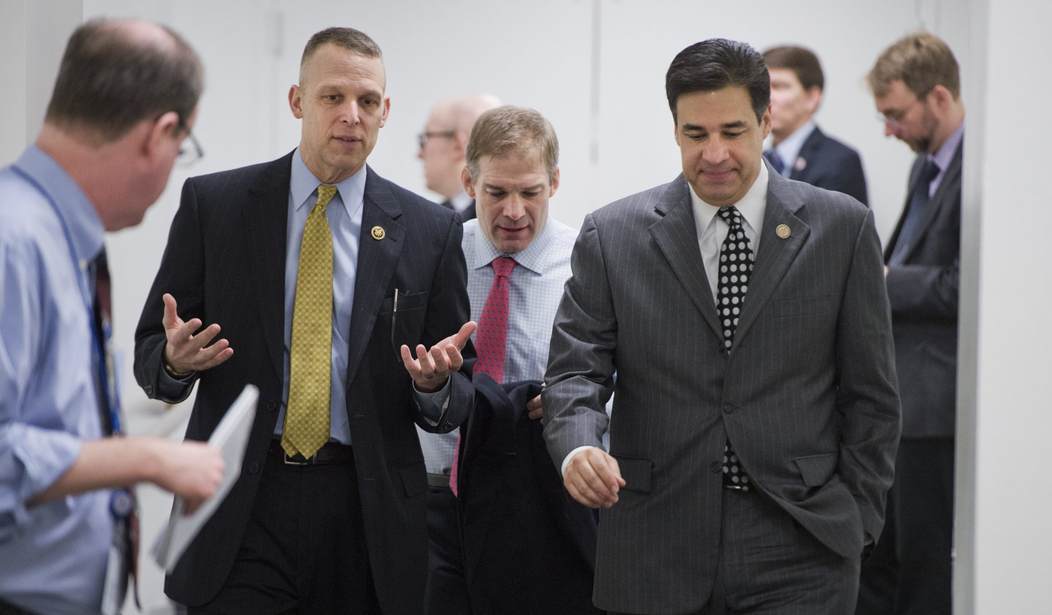WASHINGTON – Rep. Raul Labrador (R-Idaho) said President Trump’s executive order placing restrictions on travel from select countries in the Middle East is legal and suggested that Trump’s administration consider adding more countries to the list.
“As a temporary policy, I don’t have a problem with it. We do need to figure out how to vet people who are coming from these countries. I don’t have a problem with adding a few additional countries that were not on the list,” Labrador said during a “Conversations with Conservatives” event on Capitol Hill today.
The executive order covers Syria, Iraq, Iran, Libya, Somalia, Sudan and Yemen, which are “countries of concern” that came under some visa-waiver restrictions under the Obama administration.
Labrador noted that FBI Director James Comey told the House Judiciary Committee in 2015 that he could not guarantee the U.S. has enough information to fully vet Syrian refugees.
“It’s not that there’s something inherently evil about the people of Syria – there’s nothing inherently wrong about the people of Syria – it’s that they didn’t have the documentation on these individuals and he contrasted it to the people that were coming from Iraq, for example,” the congressman said.
Labrador described the executive order as “good” overall, but has some concerns about the way it was initially implemented with regards to legal permanent residents and Iraqi translators.
“We do have records of these individuals and I think they should be processed in an expeditious matter,” he said.
Labrador told reporters that he believes Trump’s executive order is within the law.
“The law specifically states that the president of the United States for national interest reasons can stop the entry of any immigrant or non-immigrant – the law is actually very clear on that, and it’s one of the areas you guys have done a really poor job of explaining that there’s a difference between entry into the U.S. and issuance of a visa. It’s a very complicated matter,” he said.
The section of U.S. Code Labrador cited reads, “Whenever the president finds that the entry of any aliens or of any class of aliens into the United States would be detrimental to the interests of the United States, he may by proclamation, and for such period as he shall deem necessary, suspend the entry of all aliens or any class of aliens as immigrants or nonimmigrants, or impose on the entry of aliens any restrictions he may deem to be appropriate.”
After reading the language of the law, Labrador said, “So, it’s not illegal.”
Rep. Scott Perry (R-Pa.) agreed with Labrador and added that the executive order is nothing new.
“It has been adjudicated in the public for a year and a half. The president said he was going to do this, he ran on this and most of the American people by way of the – at least the Electoral College, which is our process in this country – voted for him and voted for this,” he said after the event. “So while there is a minority of folks out there who are making a ruckus at the airports and in the streets or wherever they are doing it, the fact of the matter is that most of the Americans who voted for Donald Trump – one of the reasons is he said he is going to do exactly this – because they are concerned about their security.”
Perry said members of terrorist groups have said they would embed themselves in the refugee flows.
“To me, it’s just appropriate vetting. We want to make sure that if we are going to do our duty and uphold our moral responsibility to pull people out of the perilous situations they are in, that we are doing so with the diligence that is required so that it doesn’t leave our country open to threats we wouldn’t otherwise have to be open to and I think that’s what the president is doing,” he said.
Following the event, PJM asked Labrador what countries he would like to see added to the executive order.
“I don’t have enough information to know what their [the administration] reasoning was, but I would be open to looking at other countries as well,” he said.
PJM asked Perry if Saudi Arabia should have been included in the executive order since most of the 9/11 hijackers were Saudi citizens.
“I just left the Foreign Affairs Committee meeting with the king of Jordan and he implied just exactly that – that we have to be very careful, and also I think we need to be very honest about who our allies are in this fight against terrorism, and we cannot in one hand be fighting it and in the other hand be funding it. Now, he didn’t name anybody in particular and I think it’s probably a little fast for a new president to get into those kinds of squabbles with a longtime ally for different reasons,” Perry said.
“I think it’s advisable at this time to take again another look at the greater picture and say who are our friends and who are our allies and who is kind of playing both sides of that equation, and at some point say, ‘Look, that has to stop if we are going to maintain this friendship,’” he added.








Join the conversation as a VIP Member